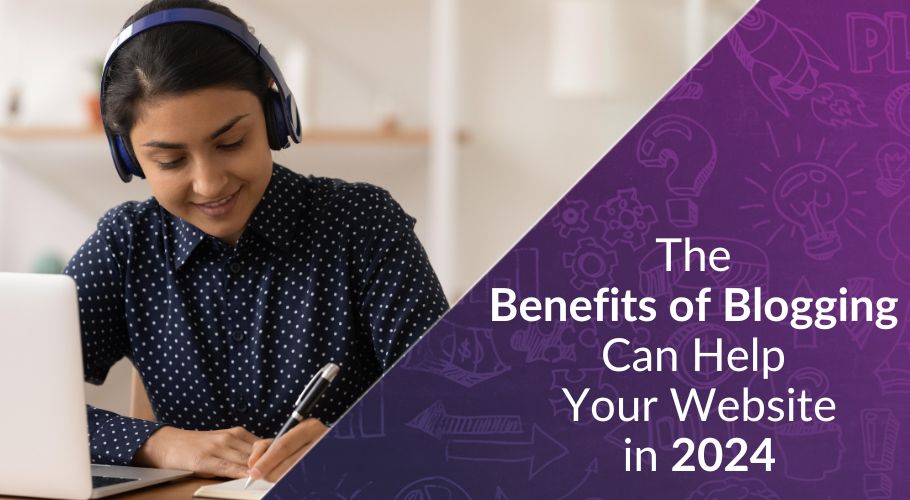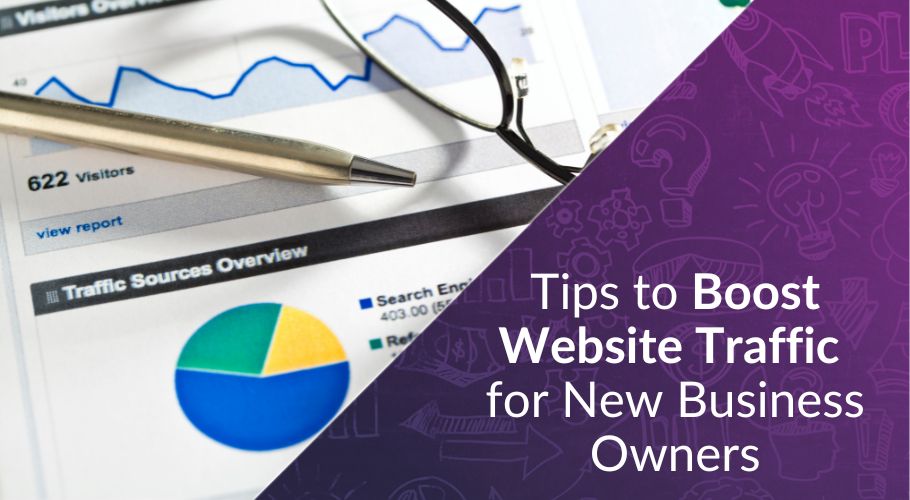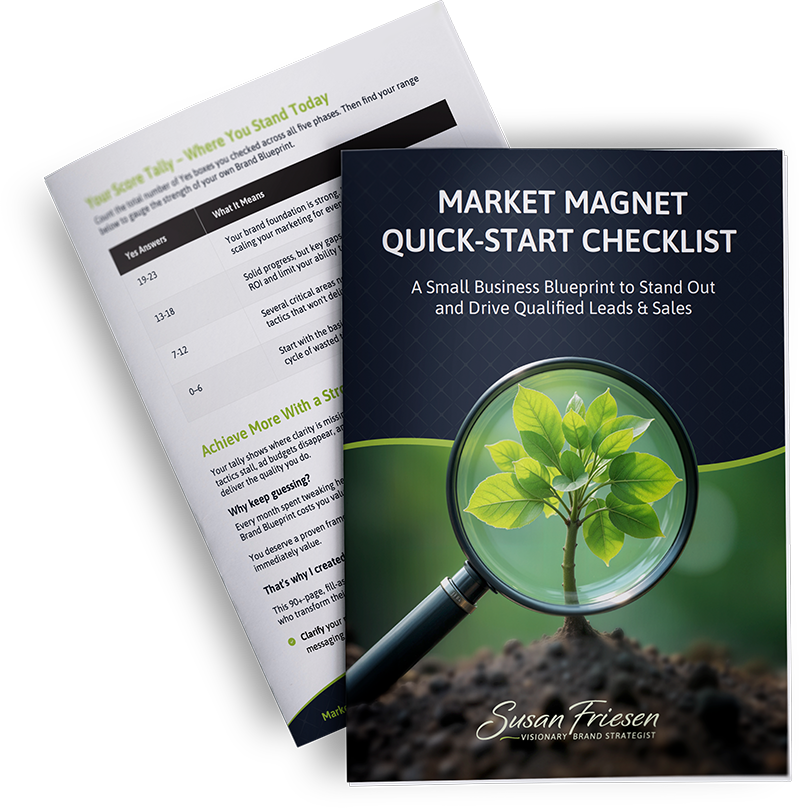So, you’re a new business owner, and you’ve finally got your website up and running.
You’ve worked hard and invested a lot of time and money in making that happen, but even after all that effort, nothing much has happened.
You’re not being flooded with new leads, orders aren’t pouring in, and the phone hasn’t rung once.
At this point, you’re probably wondering, “Why am I not getting any business from my website?” and you’re likely looking at ways to boost website traffic.
But why is it that you’re struggling to get that traffic in the first place?
Well, unfortunately, that old adage that says, “If you build it, they will come,” simply does not apply to the World Wide Web.
If you want to boost website traffic, so you can start getting all those leads, sales, and clients, you’re going to need to make a concerted effort to attract it.
But if you’re just starting out in the business world, you may not know all the tips and strategies available to increase website traffic.
So, if you’re not sure what your next steps should be, keep reading to find out what you can do to get more people to visit your website.
Read: How the Benefits of Blogging Can Seriously Help Your Website and Boost Your Business in 2024

If you want to boost website traffic and continue to increase it long into the future, you should be looking at developing a long-term strategy.
With that in mind, blogging offers one of the best ways to ensure a steady stream of traffic to your website for years to come.
So, if you want to learn more about one of the most effective ways to increase website traffic, then check out this article to learn how blogging can benefit your website.
Our Top Tips to Help New Business Owners Boost Website Traffic
Figuring out how to get people to come to your website can seem incredibly convoluted, as there are tons of different tactics, and arguably, far too many things to consider.
But if you take some time to learn how to attract more traffic to your website, you’ll realize that there’s actually a lot you can do, and it doesn’t all have to be that difficult.
With that in mind, below you’ll find our top tips on what you can do to boost website traffic.
1) Optimize Your Website for Search Engines (SEO)
Keyword Research
If you want to optimize your website for search engines, you’ve got to start by conducting thorough keyword research to identify what your ideal customers are searching for.
You can use tools like Google Keyword Planner, SEMrush, or Ahrefs to conduct this research and find the most relevant keywords.
On-Page SEO
Once you’ve identified the keywords you want to use, the next step is to ensure your website content includes those keywords in a way that’s grammatically correct and feels natural.
In any case, the keywords you’ve chosen should be used to optimize title tags, meta descriptions, headers, and image alt texts.
Technical SEO
If you want to boost website traffic, you’ve also got to ensure that your website is technically sound.
Among other aspects, that means it’s got to have a fast loading speed, a mobile-friendly design that looks great on all devices, and a secure (HTTPS) connection.
Content Updates
Search engines favour websites that consistently provide new and valuable information.
So, if you regularly update your website with fresh and relevant content, it can help to attract visitors.
2) Create High-Quality Content
Blogging
Blogging helps you build authority, credibility, and trust by allowing you to share your expertise, which can help attract visitors to your website who are interested in the topics you write about.
What’s more, as I already mentioned, updating your website with fresh content is another great way to improve your search engine rankings, and in turn, increase website traffic.
Guest Blogging
Not only does guest blogging help to expose you to a wider audience, and position you as an authority in your industry, but it also provides backlinks, which can enhance your SEO and drive more traffic to your website.
So consider writing some guest posts for websites related to your industry.
Visual Content
Visual content is much more engaging than its textual counterpart and is therefore more likely to be shared on social media, which helps to drive traffic back to your site.
So, whenever you can, you should make a point of publishing visual content, like infographics, videos, and high-quality images.
But whatever you do, make sure that this content is in alignment with your visual brand!
3) Leverage Social Media
Platform Selection
When it comes to social media, the first thing you’ll need to do is choose the right platforms where your target audience is most active.
Otherwise, you’ll end up interacting with people who have no interest in what you have to offer, and that’s not likely to help you boost traffic to your website.
Consistent Posting
Once you’ve chosen the right social media platforms, you’ve got to make sure that you’re posting regularly if you want to keep your audience engaged.
So, make sure to share anything your audience would be interested in, including blog posts, special offers, behind-the-scenes content, informative facts, humorous anecdotes, inspirational quotes, case studies, and customer testimonials.
Engagement
Social media can also be used to engage with your audience and build a community around your brand, which can encourage more people to visit your website.
This can be done by doing things like responding to comments and messages and participating in discussions.
Social Media Advertising
You can also invest in social media ads if you want to reach an even broader, yet more specific audience.
Platforms like Facebook, Instagram, and LinkedIn offer targeted advertising options to ensure you’re only advertising to your ideal customers.
4) Use Email Marketing
List Building
If you haven’t done so already, you should start building an email list as soon as you possibly can, as this will help you stay in touch with your audience and drive them back to your website.
And if you’re looking for ways to encourage people to give you their info, you can offer incentives like discounts, exclusive content, or free resources.
Newsletters
Another great way to keep your audience informed and entice them to return to your website is by sending out newsletters.
So, once you’ve built up your email list, then you can start sending out newsletters and persuade subscribers to visit your site using valuable content, updates, and special offers.
Automation
You can also use email marketing automation tools to send personalized emails based on user behaviour and give new subscribers even more reasons to visit your website.
For example, you can send a welcome email series to new subscribers or re-engage inactive customers with personalized offers.
5) Engage in Online Communities
Forums and Groups
Participating in online forums and social media groups related to your industry can also help you build authority and drive organic traffic to your website.
You can do this by sharing your expertise and providing valuable insights without directly promoting your business.
Q&A Platforms
Another tactic to consider is answering questions on platforms like Quora or Reddit.
These interactions allow you to display your expertise by offering helpful answers and they also give you the opportunity to include a link to your website when it’s relevant.
6) Utilize Paid Advertising
Pay-Per-Click (PPC) Advertising
Platforms like Google Ads allow you to run pay-per-click campaigns that place your website near the top of the search results for your chosen keywords and charge you every time someone clicks.
This allows you to use very specific keywords and target demographics, which helps drive highly relevant traffic to your website.
Display Ads
Display ads are a form of advertising that appears on things like websites, apps, and social media platforms.
Investing in these kinds of ads can help you reach a larger audience, increase awareness of your brand, and by extension, your website traffic.
Retargeting
Using retargeting ads allows you to re-engage with visitors who have previously visited your website but didn’t convert.
That being said, retargeting can help bring them back to your website and complete their purchase or take whatever action you’d like them to take.
7) Analyze and Optimize
Google Analytics
If you want to track your website’s performance, including your traffic, you should be using Google Analytics.
This platform allows you to analyze metrics such as traffic sources, engagement, and user behaviour to understand what’s working and what needs improvement.
A/B Testing
Sometimes, what’s on your website just won’t resonate with your target audience.
With that in mind, A/B testing can help you identify what resonates best with your audience by testing out different versions of the various elements on your website, such as headlines, images, and calls to action.
8) Build Backlinks
Quality Backlinks
In case you’re not sure, the term backlink is just marketing jargon for a link from another website to your website.
These links can bring traffic to your site from those who click on them, and having backlinks from reputable websites can also help to improve your search engine rankings.
But you’ve got to make sure those links are coming from reputable websites, otherwise, it could have the opposite effect and end up hurting your website rankings.
Resource Pages and Directories
If you want to boost website traffic, getting your website listed on resource pages and industry directories is another great thing to do.
These pages often link to helpful resources and can drive targeted traffic to your site.
9) Offer Valuable Resources
Free Tools
Creating free tools or resources that are relevant to your audience, like templates, videos, or e-books can also help you get traffic to your site, as they can attract visitors looking for useful tools.
Webinars and Workshops
Hosting webinars or online workshops on topics of interest to your audience can also give people a reason to visit your website and keep coming back for more.
10) Local SEO
Google My Business
If you’re looking to increase website traffic, you should also make sure to optimize your Google My Business profile.
This profile offers yet another way for people to discover your website, and it can help your SEO, as it makes you more visible to those searching locally, enhances credibility and trust, and maintains consistent NAP (name, address, and phone number) information on your business.
Local Content
Creating localized content tailored to your target audience can also help to bring local traffic to your website.
This can include things like blog posts about local events, news, or collaborations with other local businesses.
Local Directories
Getting listed in local directories and online maps can also help to drive traffic to your website, as it helps you attract local customers who are searching for businesses like yours.
11) Enhance the User Experience
Website Design
A well-designed website builds trust and encourages visitors to stay longer.
Having said that, if you want to give people who visit your website a reason to stay, and a reason to return, you’ve got to ensure your website has a clean, professional design.
Navigation
To avoid annoying or confusing users, and giving them a reason to leave your website, you should make sure it’s easy to navigate.
This involves using clear menus, categories, and search functions to help visitors find what they’re looking for easily.
Mobile Optimization
With the majority of users accessing websites via mobile devices like smartphones and tablets, if you want them to have a great experience on your site, it has to be fully optimized for mobile use.
Loading Speed
Slow-loading websites can frustrate users, which may cause them to leave and never come back.
So, if you want to stop this from happening, make sure to optimize your website’s loading speed, which should take no more than 1-2 seconds.
To your business success,
Susan Friesen
P.S. If you liked the article, you might want to subscribe to our newsletter. We publish tons of valuable content to help you learn more about marketing, and subscribing is the best way to ensure you don’t miss out. Additionally, if you’d like to learn more about building a search engine optimized website, click here for our free website guide.







